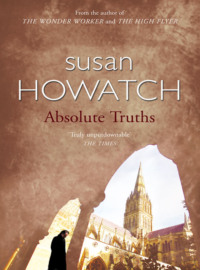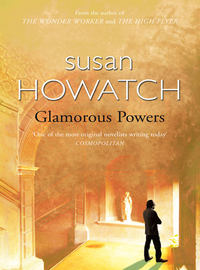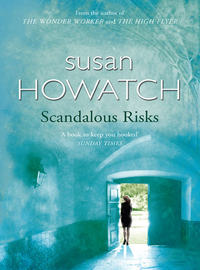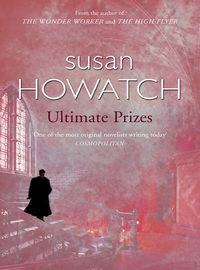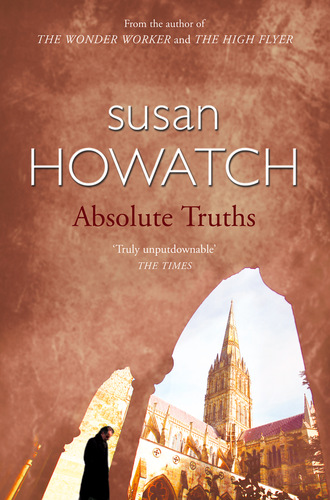
Полная версия
Absolute Truths
In silence I returned to the chapel, and in silence Aysgarth, not to be spiritually outdone, padded along by my side.
I wondered what Jon would have said, but decided I was much too depressed to want to imagine.
VII
The stranger nipped out so smartly at the end of the service that he still managed to avoid introducing himself, but everyone had noticed him and everyone wanted to know who he was.
‘Any news?’ said Lyle, bringing me my eggs and bacon as I finally reached the dining-room.
‘Stephen and I bared our teeth at each other.’
‘That’s not news, that’s just history repeating itself. Did you tell Paul that I’ve found yet another possible wife for him?’
‘I’m afraid I forgot. I was diverted by an unknown priest who looked like an English version of Elmer Gantry.’
‘How exciting!’
‘Not for the bishop who has to mop up the inevitable mess.’
I began to skim through The Times. Lyle filled my coffee-cup at intervals and provided hot buttered toast at exactly the right moment. ‘I do wonder what’s happened to Michael,’ she said after refilling my cup for the second time. ‘Will Dinkie break off the engagement straight away or will she wait until she has her claws into Robert Welbeck?’
But I did not want to think of Michael. Instead I retreated to the office where Miss Peabody, already informed by Lyle of my approaching visit to the hospital, was waiting to tell me how appalled she was by the news of Desmond’s assault. The typist had not yet appeared, but from the window I could see my chaplains pausing by the gate to finish their conversation before they turned up for work. At once I glanced at my watch, but they still had five minutes to spare before they were due to cross my threshold. Mentally shelving my standard lecture on punctuality I said to Miss Peabody: ‘Anything interesting in the post?’
‘Nothing urgent.’ Miss Peabody, a large woman of indeterminate age whose favourite colour was navy blue, adjusted her pince-nez before adding: ‘But there’s the most unusual letter from a divorced priest in the Radbury diocese who wants to work in Starbridge. He’s been in a mental hospital for some time.’
‘Draft a letter telling him kindly that I license neither divorcés nor lunatics.’
‘Oh, he wasn’t a patient, Bishop! He was in the mental hospital as a chaplain, but he says he feels he’s now being called to establish a healing centre in a parish setting.’
‘I don’t license charismatic wonder-workers either,’ I said, and then reflected with horror that this description could be applied to Jesus Christ. Rapidly I added: ‘Just tell him the Bishop has a policy of never licensing divorced priests.’
‘But Bishop,’ said Miss Peabody, whose resolute nature could sometimes lead her to sound like a nurse telling her charge that ‘Nanny knows best’, ‘he has the most glowing reference from the Abbot-General of the Fordite monks.’
This was indeed surprising. The Fordites were Anglican-Benedictines who represented the apex of the High-Church wing, and I would have expected their leader to be as opposed to divorced clergymen as I was. ‘Never mind the Abbot-General,’ I said, the recalcitrant charge determined to ‘talk back’ to Nanny. ‘Where’s the reference from the man’s bishop?’
‘There isn’t one.’
‘Exactly. The man’s obviously been sacked for improper conduct and is now trying to wriggle into another diocese by reviving an old connection with the Forditcs. Write to him at Radbury, Miss Peabody, and –’
‘Oh, he’s not at Radbury now, Bishop! He’s here in Starbridge and staying at the Crusader.’
‘Camping on my doorstep,’ I said, ‘will get him nowhere. In fact –’ I broke off as I put two and two together and made an astonishing four. ‘Wait a moment,’ I said slowly. ‘Wait a moment …’
Miss Peabody waited obediently, but so mesmerised was I by the notion that an English version of Elmer Gantry might be attempting to invade my diocese that when I spoke I could only produce a completely irrelevant question. It was: ‘How on earth can an unemployed priest afford to stay at the Crusader?’
‘I don’t know, Bishop – he doesn’t divulge his financial circumstances,’ came the unfalteringly serious reply. (Nothing a bishop said was ever judged irrelevant by Miss Peabody.) ‘But the letter is literate and suggests that he’s a gentleman.’
Ignoring this romantic notion that literacy and good breeding invariably coexist, I said abruptly: ‘I can’t possibly see him. It would be a waste of my time, particularly as it would be out of the question for me to license a divorced priest for parish work. Think of the comments I should get from the Mothers’ Union! No, no, Miss Peabody, write to the man and –’
The telephone rang. I was still so bemused by the manifestation of an Elmer Gantry in my diocese that I picked up the receiver before Miss Peabody could take the call.
‘Charles?’ said the suffragan Bishop of Starmouth, startled to speak to me without being delayed by an intermediary. Nigel Farr had by that time been assisting me in the south of the diocese for six years, and although I gave him a free hand to run Starmouth as he thought fit we kept in close touch and he always consulted me over problems of behaviour among the clergy. On that particular morning he was worrying about a curate who had been preaching sexual liberation behind his vicar’s back while running the parish youth club.
‘… and according to the enraged vicar there’s now an anonymous letter accusing the curate of flirting with a fourteen-year-old moppet.’
‘Almost certainly the product of another fourteen-year-old moppet who fancies the curate herself,’ I said, ‘but anything’s possible. What’s the vicar been doing while his curate’s run amok? Obviously their relationship has broken down – see the pair of them, reintroduce them to each other and drill it into that curate’s head that it’s his business to fight the permissive society, not to join it. No clergyman sanctions immorality in this diocese,’ I added, adding some familiar words out of habit as I glanced at my watch and shuddered at the prospect of my interview with Desmond. I suddenly remembered that the petrol tank of my car was almost empty – which would mean a stop on the way to the hospital – which in turn meant I had less time than I had thought. Truncating the conversation with Nigel I promised to phone him back later and replaced the receiver.
Immediately the phone rang again. This time Miss Peabody pounced. Meanwhile my chaplains had arrived and were milling around like a couple of dogs who needed to be taken for a walk. ‘Bishop, if I could just have a word with you about your visit to the alms-houses …’ ‘Bishop, if I could just see you about your meeting today at Church House …’ As I listened to this chorus with half an ear I suddenly realised Miss Peabody was saying: ‘Just a moment, Archdeacon, I’ll see if he’s available.’
I grabbed the receiver. ‘Malcolm?’
‘Good news, Charles. The police have arrested a man for the attack on Desmond. He’s a lunatic, just released from mental hospital, who’s got a phobia about Roman Catholic priests. When he walked into the police station this morning to confess, he told them he thought that St Paul’s was an RC church and that Desmond was one of the Pope’s flock.’
‘So he was quite unknown to Desmond?’
‘No previous connection whatsoever.’
‘Thank God. Talk to you later.’ I hung up and immediately, as my chaplains began to mill around me again, Miss Peabody said in her firmest voice: ‘Time for you to go to the hospital, Bishop.’ The typist had arrived red-nosed and was busy sneezing over everyone. Edging out of the room I promised my chaplains they would have my full attention on my return, and on reaching the hall I found that Lyle was already waiting with my hat and coat.
I said distractedly: ‘The car’s nearly out of petrol.’
‘No, it isn’t. I put some in while you were at the Cathedral.’
In the office the telephone was ringing again, and for one poignant moment I pictured myself back in Cambridge with nothing to do all morning but write about Hippolytus and Callistus.
‘Off you go, darling,’ said Lyle propelling me outside, ‘and don’t get bogged down with Desmond. It’s bad for your blood pressure when you fall behind in your timetable.’
I hurtled away down the steps to my car.
VIII
The sun was now shining but the air was still cold and the Cathedral had a hard, dense, sculpted look as it rose from the frozen grass of the churchyard. Above the central tower the spire narrowed to a pinpoint against an ice-blue sky. Leaving the Close by the main gateway I drove with dread to the hospital.
I had no doubt whatsoever that Desmond would have to be sacked, although obviously the sacking would have to wait until he had recovered from his ordeal. One simply cannot keep priests who persist in hoarding pornography and in consequence risk embroiling the Church in scandal. I would do my best to help Desmond overcome his problems; I would arrange the best medical care, the best spiritual direction, the best possible form of early retirement. But there was no question of allowing him to continue at St Paul’s. I was all too aware that Malcolm and I had had a very lucky escape from disaster. To let Desmond remain in his job would have been the height of foolishness.
It was precisely because I knew Desmond had to be sacked later that this visit to the hospital promised to be such an ordeal for me; I knew I had to conceal the decision to sack him in order to offer him something which resembled pastoral care, and as I reluctantly prepared to hide behind the public persona which Jon called my glittering image, I found that shame was mingling with my dread. Dissimulation is not a comfortable course for a bishop to take, even when the purpose is to be kind to a sick man in hospital.
On arrival I was directed to a distant ward and found Desmond in a long room with a dozen other patients. The nurse on duty had warned me that because of the injuries to his jaw he was unable to talk, but despite this warning I was still shocked when I saw him. Heavy bandages hid most of the bruises but the flesh around his eyes was dark and swollen. Normally Desmond had rosy cheeks which in combination with his round blue eyes and lack of hair gave him a resemblance to an affable baby. The brutal destruction of this innocent appearance seemed unforgivably cruel. I found it hard not to flinch.
‘How very sorry I am to see you like this, Desmond,’ I said, drawing up the visitor’s chair and sitting at his bedside. ‘What a terrible thing to happen.’ And I took his hot, damp hand in mine.
His eyes filled with tears, and at once I found the scene so distressing that I hardly knew how to endure it. I realised he was reminding me of my POW days and the men who had been beaten up, but I realised too that I had to blot out all thought of the past in order to deal with the present. Tightening my grip on his hand I said quickly: ‘It’s all right, I know you can’t speak and I know you can remember nothing about what happened. I’ve just called to tell you the man was a mental patient who had never met you before, so there’s no need to torment yourself with the thought that you were attacked by someone you knew who had a grudge against you.’
Desmond was now struggling to blink back his tears, and I found this pathetic attempt to keep a stiff upper lip for his bishop almost intolerably touching. Speaking more rapidly than ever I said: ‘And don’t worry about the parish. The Archdeacon will see that mass is celebrated every day – and yes, we do realise that Father Pitt is only fit enough to take the occasional service. I intend to seek Bishop Farr’s help in finding a locum – Starmouth is more of an Anglo-Catholic stronghold than Starbridge, as you know.’ I realised as I spoke that I had forgotten to mention the problem to Nigel when we had discussed the fourteen-year-old moppet, so I made a mental note to telephone him as soon as I returned home. ‘The point is,’ I heard myself saying, ‘that you must have all the time you need to get fit again, and your prime task now is to focus on making a good recovery.’
A single tear trickled down Desmond’s cheek as he lost the battle to beat back his emotion. I suspected guilt was now mingling with all the pain and shock, guilt that he was not worthy to receive kind words from his bishop. Repressing a shudder at the thought of the pornography and somehow keeping my voice calm despite the hellish level to which the scene was sinking, I asked: ‘Does the chaplain know you like to receive the sacrament every day?’
He shook his head.
‘I’ll make sure he’s told. Now … shall we take a moment to pray?’
He achieved a nod. I then had the task of framing some appropriate sentences, but I was in such a state of distress by this time that my creative powers failed me and I found myself falling back on a prayer I had used as a POW. This upset me still further, but with an iron will I clamped down again on the harrowing memories and followed the prayer with a recitation of the matins’ collects. I was wondering if I should offer the laying-on of hands. Many sick people find this sacramental gesture comforting, but I had my doubts about whether I should attempt it in this case. Jon was keen on the laying-on of hands but always said it should never be attempted in a situation where there was a marked ambivalence of feeling. This was because the darker side of the ambivalent emotions would block the healing power of the Holy Spirit, with the result that only the negative feelings of the ego would be communicated.
In the end I thought: better safe than sorry. So I made no sacramental gesture, but still my anxiety remained at a high level. I was now wondering if Desmond was seeing the attack as a punishment for his sins, and I knew I should take time to demolish this superstitious dread. God, after all, hardly requires someone else to beat us up. We are only too busy beating ourselves up by committing wrong acts which have unpleasant consequences.
‘Desmond,’ I said after concluding our prayers, ‘I can’t leave without making sure you don’t misinterpret this appalling crime. First, although we can’t deny that God has created a world in which random violence takes place, we can be certain he never wills this random violence to happen. And second, we can be certain that because he never wills suffering he’ll strive always to redeem it by bringing good out of –’ I broke off. I had realised that for Desmond good was not going to come out of evil because as the result of the assault he was going to lose the job which constituted his entire life. But now was obviously not the time for a complex meditation on the mystery of suffering. Now was the time for a good bishop to speak with confidence in order to reassure Desmond as he deserved. I had to offer certainties, not doubts. ‘– by bringing good out of evil,’ I concluded firmly. I stood up as I added: ‘Forgive my hesitation, but I was thinking for a moment of your suffering and feeling upset.’ I might have said more, but when I saw Desmond’s eyes were shining with tears again I gave him my blessing, promised to visit him later and fled.
Outside the hospital I sank down in the driving-seat of my car and grappled with the horrible thought that despite all my efforts I had been a pastoral failure, but there was no time to grapple for long. Raggedly I drove home for the next segment of my obstacle race.
By the time I arrived at the South Canonry I had reviewed what I had to do before leaving for London. I had to tell Edward, my priest-chaplain, to talk to the chaplain at the hospital and make sure Desmond received the sacrament daily. Then I had to phone Nigel in Starmouth to tell him to dredge up an Anglo-Catholic locum. Then I had to have a conference with Roger, my lay-chaplain, about the Church House meeting and get him to explain the graphs which I had failed to look at yesterday. Then I had to remember to take my formal uniform to London – I broke off to wonder if my favourite frock-coat had come back from the cleaners.
Halting the car with a screech of the brakes I leapt out, hared up the steps to the porch and flung wide the front door.
But the next moment I had stopped dead.
Standing stock still in the middle of the hall was none other than the sinister priest who had reminded me of Elmer Gantry.
FIVE
‘Nothing blinds us to the true and living image of God except the false man-made idol, worldliness.’
AUSTIN FARRER
Warden of Keble College, Oxford, 1960–1968
Said or Sung
I
When I had the chance to observe him at close quarters I saw that he was merely a plain man in his early forties with a thickset figure which would have profited from regular exercise on a golf course. His nose was too large, his jaw too square and his mouth too thin for his features to be judged other than irregular. At a loss to understand why he should be planted in my hall when he had no appointment to see me, I gave him my chilliest stare and waited for Miss Peabody to rush from the office to my rescue.
But the priest was clearly not a man who let the grass grow under his feet. Moving forward he held out his hand and said warmly in a courteous voice: ‘Good morning, Bishop! My name’s Lewis Hall.’
Finally detaching my feet from the threshold I closed the front door and allowed my hand to be gripped. But before I could utter a word Miss Peabody erupted from the office. ‘Oh Bishop –’ I had seldom seen her so flustered ‘– this is the gentleman from Radbury whom we were discussing earlier. I did explain that it was quite impossible for you to see him, but when I mentioned that you’d gone to the hospital to visit Father Wilton he asked if he could wait for your return so that he could hear the latest news.’
This was a move which contrived to be both thoroughly Christian and immensely cunning. As Miss Peabody quivered vanquished before me and I found myself registering a reluctant admiration for the man who had outwitted her, the stranger saw the chance to build on his success by cornering me for conversation.
I clearly remember thinking to myself: this man shall not pass the threshold of my study.
Meanwhile the man was saying soberly: ‘I do hope Father Wilton’s progress is satisfactory. I was very struck by the way you spoke of him at matins.’
I could not recall saying anything in particular about Desmond himself; I had merely announced that he had been the victim of an attack. Confused by the discrepancy I became fatally hesitant. ‘Well,’ I began, but that was all I was allowed to say.
‘Since you referred to him as Father Wilton, I assume he’s an Anglo-Catholic,’ said my visitor, ‘and if you’re now looking for a locum, may I volunteer for the job? I’m an Anglo-Catholic myself, and Miss Peabody confirms that you have my reference from the Abbot-General of the Fordite monks.’ He gave Miss Peabody a radiant smile.
Miss Peabody turned pink, in the manner of a wallflower suddenly asked to dance by the beau of the ball, and babbled: ‘I did mention the reference to you, Bishop, and if you want me to fetch it –’
I held up my hand. She stopped. I opened my mouth to take control of the conversation. ‘I thank you for your kind offer, Mr Hall,’ I said. ‘I shall forward it to the Archdeacon. And now I have a train to catch shortly. If you’ll excuse me –’
‘Yes, of course, Bishop. I’ll be only too happy to come back at a more convenient time.’
This assurance was not what I wished to hear at all. In a moment of fury I repeated to myself: this man will never cross the threshold of my study.
‘Mr Hall,’ I said, ‘I’m aware that you feel called to establish a healing centre and certainly I wish you every success. However, I feel bound to say that in this diocese I have a policy of never licensing –’
‘I want to specialise in priests who have suffered a spiritual breakdown.’
Silence fell upon us all, but now I no longer saw the stranger, still as a statue, or Miss Peabody, fluttering in the background. As the memories of 1937 cascaded through my mind I saw only Loretta on that Surrey hillside and Alex Jardine removing the decanter from me when I had been so very drunk at his episcopal palace – although I never thought of those incidents nowadays, never, they were all buried so deep in my mind that I never had to think about them – indeed I never had to think about any incident from that spiritual breakdown, my first catastrophe, but now I was thinking, now I was remembering, and I could hear my younger self reciting the words of the General Confession to Jon, who had helped me survive.
‘… spare thou them that confess their faults … restore thou them that are penitent …’ I remembered how I had been spared and restored. I remembered how conscious I had been of the healing power of the Holy Spirit as it moved ceaselessly through the world to raise up and renew all that was broken and cast down. I remembered that I had not always been a strong, successful bishop, battling contra mundum to preach the absolute truths.
My worldliness and my sophistication, those two hallmarks of a civilised man at the top of his profession, abruptly dissolved; it was as if a curtain had been rent from top to bottom by an unseen hand so that light could pour into the darkened room beyond. Acting instinctively – because for one mysterious moment my entire intellect had been bypassed – I turned, gestured to the door of my study and said to the stranger: ‘Come in.’
Then I myself led the way over the threshold which seconds ago I had sworn he would never cross.
II
I should make it clear that I did not immediately think: ah, this is the Holy Spirit in action and I must give this man everything he asks for. I merely wish to explain why I let Hall cross the threshold of my study when I had resolved to refuse him admittance. In fact one has to be most cautious about detecting the presence of the Holy Spirit. It is all too easy to be driven, by mental stress or psychological peculiarities or faulty reasoning, to make a mistaken identification, and I knew as soon as I had recovered from my moment of impulsiveness that I would have to be very careful what I said next. It was more than possible that Hall’s invasion of the South Canonry had nothing to do with the will of God at all. Indeed one could just as easily argue that the Devil was pushing this man into my diocese to cause disruption, and that the memories of my spiritual breakdown had reduced me to a state of addleheaded incompetence.
Having thus flogged myself back within the boundaries of common sense, I said abruptly to Hall: ‘What’s so special about the Starbridge diocese that you should feel called to work here?’
‘You.’
‘Me?’
‘Yes, my friends among the Fordite monks said you took a special interest in priests who had suffered breakdowns. They mentioned no names, but they told me about one priest who’d been kicked out of the London diocese after an incident in a public lavatory. No one else would touch him but you gave him a second chance.’
I found I was too overwhelmed by the irony of this latest twist of the conversation to reply. My decision to give Desmond a job – a decision which had just been proved disastrously unsound – was now being presented to me as a powerful Christian action which was still having important consequences. So confused did I feel at this point that I had to make a considerable effort to concentrate on what Hall said next.
‘I was intrigued by this story,’ he was adding, ‘because it was so contrary to your popular image as a bishop tough on sexual sin. That was when I realised you had to be a far more subtle and complex character than your enemies were willing to believe. I decided to find out more about you, and soon I realised how much I respected your attempt to uphold traditional moral standards, your advocacy of spiritual direction, your friendly attitude to both wings of the Church and your unusual ability to be both a highly-qualified theologian and a gifted spiritual leader. I felt then that you were exactly the bishop I was looking for – and after the recent change of bishops at Radbury I assure you I was looking hard. I got on well with Derek Preston, but Sunbeam leaves me cold.’


